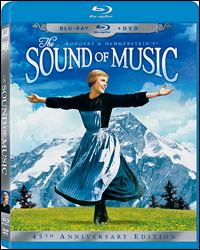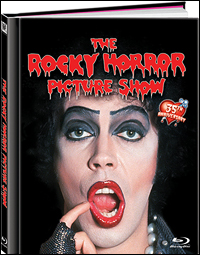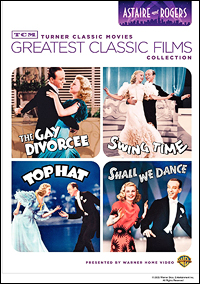
*
And now at long last the wait is over. That is, for those of you who were unavailable, otherwise disposed, or unborn on Nov. 16, 1966, when Evening Primrose [E One] was telecast as part of the ABC Stage 67 series. For the one and only time; this 50-minute original television musical was fated never to air again, and has never been issued on VHS, DVD or anything. A copy has been available for viewing at the Paley Center (formerly The Museum of Television and Radio), and a bootleg has long been making the rounds of collectors. Otherwise, "Evening Primrose" has been invisible lo these 44 years.
And what of it? Ah, those who ask must not be Sondheim fans. Stephen Sondheim was already well established in 1966, with both A Funny Thing Happened on the Way to the Forum (1962) and Anyone Can Whistle (1964) on his composer resume (as well as a couple of popular shows for which he'd written the lyrics). But Sondheim was to enter a new stage in his creative life — and those into hyperbole might say singlehandedly changed the course of the Broadway musical — with Company (1970) and Follies (1971). And the four songs in this long-hidden "Evening Primrose" can be said to represent the first appearance of this new, improved, and incomparable Sondheim.
Let us backtrack. ABC Stage 67 was an attempt by network execs to give the mass audience innovative, cultural programming. One hour a week, anyway. The network commissioned pieces from distinguished artists in various fields; the whole idea turned out to be a costly bust, with only one of the 26 episodes — Truman Capote's "A Christmas Memory," starring Geraldine Page — standing out. (Musical comedy attempts included quickly forgotten works from Bock & Harnick, Richard Adler, and Betty-Adolph & Jule.)
Sondheim, at the time, was severely underemployed. He was working with playwright James Goldman on a musical called The Girls Upstairs, which had been announced by his Gypsy producers but seemed to be permanently stalled. So when the Stage 67 project came along, Sondheim and Goldman wangled one of the slots for an original musical based on a macabre story by John Collier. Macabre in that the characters — refugees from the real world — live by night in a big city department store, with a very real risk of being transformed into very dead mannequins. "Evening Primrose" is not great dramatic art, no. But the songs! If we say they are the harbinger of the mature Sondheim of the Company/Follies era, there is a reason. The Girls Upstairs, after six years or so, would finally see life — in rewritten form — as Follies. Thus, some of the songs — like "Waiting Around for the Girls Upstairs," a critical part of the Sondheim canon — were written prior to "Evening Primrose." Listening to the four songs in the 50-minute TV musical — "I'm Here," "I Remember," "Wait" and "Take Me to the World" — we hear the sound that by 1973 would be recognizable as distinctive Sondheim.
In addition to the music, "Evening Primrose" gives us Anthony Perkins — at the time a major motion picture star — as a conflicted thirty-something New York City poet; the same Anthony Perkins who was originally announced as star of the forthcoming Company. Was the role of Bobby created with Perkins, a friend of Sondheim's, in mind? Perhaps. Watching him in "Evening Primrose," we can see how well he would have fit in Company.
The DVD also gives us a chance to see Dorothy Stickney — star of the record-breaking Life with Father, wife to playwright Howard Lindsay, sort of a Helen Hayes without the extreme talent. Also on hand is Charmian Carr, who had recently made a splash as Liesl in the screen version of The Sound of Music. As Ella, Perkins' love interest among the night people, Ms. Carr turns out to be pretty good. And she does a great job with "I Remember." Bonus features include an interview with director Paul Bogart; an audio interview with Ms. Carr; and test footage of Perkins. This last isn't of much interest, as there is no sound included; it does however show us what "Evening Primrose" might have looked like in color. (The DVD has been reproduced from a black-and-white copy of the show, as no color print has been located.)
Read Playbill.com's recent conversation with Paul Bogart, the director of the 1966 TV production.
 |
*
 |
The Broadway Rocky Horror was a bust, closing after six weeks. I found the thing to be sophomoric, myself; and neither "The Rocky Horror Picture Show" — which has had a cult following since it first appeared — nor the recent Broadway revival has changed my opinion. Never having been enthused by the "Time Warp," the new Blu-ray doesn't exactly have me dancing in the aisles (or the crypt). But I should not be counted as the target audience. I expect fans of Rocky and his gang will love it. The disc comes in DigiBook packaging, with said book chock full of colorful photos. Included are both the U.K. and U.S. versions of the film, along with myriad bonus features. "Rocky Horror" fans are likely to have a rocky holiday, singing along and riffling through all those interactive goodies. Way past midnight, in groups perhaps, with some of 'em no doubt in costume.
*
 |
Somebody at TCM presumably agrees with me, and what do you know? They have now released an Astaire and Rogers entry of their Turner Classic Movies Greatest Classic Films Collection [Warner]. Two double-sided discs containing "Swing Time," "Top Hat," "Shall We Dance" and "The Gay Divorcee"! And including what seem to be all the extras that accompanied these films in the deluxe "Complete Film Collection." At, needless to say, a price that is a mere fraction of the 12-disc affair.
Yes, this release is relatively utilitarian, but hey — devoted A&R fans no doubt already possess the whole enchilada. People who enjoy the better films but couldn't see their way to splurge for "Carefree" and "The Barkleys of Broadway" can now get what I consider to be the Best of Astaire and Rogers. Sit and watch "Swing Time" again, why don't you? No, you won't be in heaven — that's I. Berlin's "Cheek to Cheek," in "Top Hat." Nor will you be impelled, most likely, to kiss while you're dancing — that's "The Continental," in "The Gay Divorcee." But you'll get one of the best collection of songs written for the screen ever, from Mr. Kern and Ms. Fields, and you'll want to pick yourself up, dust yourself off, and watch "The Way You Look Tonight" again.
(Steven Suskin is author of the recently released Updated and Expanded Fourth Edition of "Show Tunes" as well as "The Sound of Broadway Music: A Book of Orchestrators and Orchestrations," "Second Act Trouble" and the "Opening Night on Broadway" books. He can be reached at [email protected].)
*
Visit PlaybillStore.com to check out theatre-related DVDs for sale.









